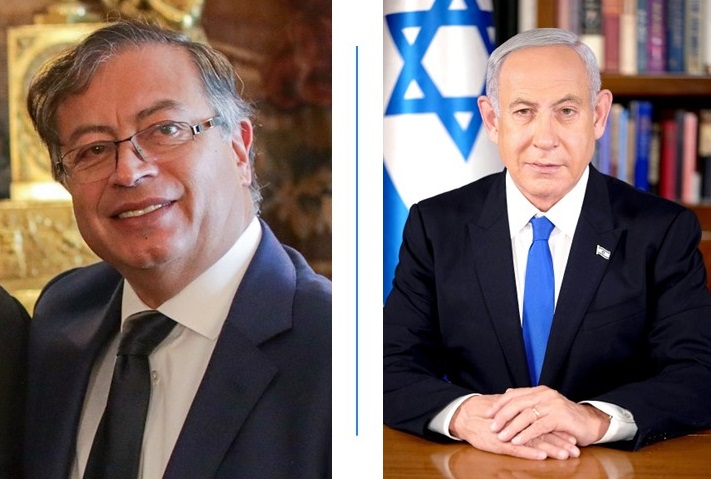
A new diplomatic crisis has emerged between Colombia and Israel. After the United Nations Security Council, for the first time, demanded that Israel initiate a ceasefire in its military operations in the Gaza Strip, Colombia threatened to break diplomatic relations with that country if Netanyahu’s government did not comply with the international resolution.
The Israeli response came through its Minister of Foreign Affairs, Yisrael Katz, who accused, without evidence, the President of Colombia of supporting terrorism and called his government “a disgrace to the Colombian people”.
Accusation of supporting terrorism
The Colombian government’s threat to break diplomatic relations with Israel, if that country does not comply with the international resolution demanding a ceasefire in Gaza, received a forceful response from this country. Through the Minister of Foreign Affairs, Yisrael Katz, the government of Prime Minister Benjamin Netanyahu affirmed that “it would not yield to any pressure or threat”.
“Colombian President Gustavo Petro’s support for Hamas murderers who massacred and committed heinous sexual crimes against babies, women, and adults is a disgrace to the Colombian people. Israel will continue to protect its citizens and will not yield to any pressure or threats,” Minister Katz said in a statement on his social networks.
Shortly thereafter, Colombia responded by denying the harsh Israeli accusations, while insisting that calling for a halt to attacks against the civilian population does not mean that it is supporting the terrorist group. “Colombia’s position cannot be misrepresented as support for terrorism, but quite the contrary, it is a call to follow the mandates of the Charter and the international community expressed in the resolution adopted by the Security Council,” reads the statement issued by the Colombian Ministry of Foreign Affairs.
Similarly, the Colombian government again stressed the need for Israel to allow the entry of humanitarian aid to Gaza, the release of all hostages, while calling for the protection of the civilian population, in compliance with the ceasefire demanded by the international community.
“Colombia continues to call for respect for international law and directly condemns violations of international humanitarian law and international human rights law. Actions against the civilian population and against protected property must cease,” said the Colombian diplomacy.
Five months of disagreements
This is just the latest chapter in the long history of misunderstandings between Colombia and Israel. The diplomatic crisis between the two countries began at the very moment that the Israeli army entered Gaza in blood and fire, in a large-scale military operation in response to the criminal acts committed by Hamas on October 7.
Since then, accusations and difficulties of understanding have gone through several phases. The Colombian president went so far as to label as “Nazi practice” a military incursion that has caused thousands of deaths and has not distinguished between Palestinian civilians and militiamen.
Despite meetings in Bogota with the Israeli ambassador and attempts to lower the tension, the Netanyahu government’s determination to continue with the war in Gaza has been complicating its relations with some countries, including Colombia. At this point, and with the Israeli response that ignores the UN resolution, the diplomatic rupture with Colombia seems only a matter of time.
In fact, it was Minister Katz who stated in his social networks that Israel “will not order a ceasefire” despite the UN ruling, and that it “will destroy Hamas and will continue fighting until the last of the hostages returns home”.
Israel’s international isolation
Although UN resolutions are legally binding, they may not be complied with, as has happened in the past. However, this new situation is evidence of Israel’s international isolation, including its distancing from the United States, its main ally.
After several attempts, in the last vote, the US did not use its veto right in the Security Council to stop the resolution in favor of the ceasefire. It was finally approved by fourteen votes in favor and only one abstention.
Israel has already announced that it will not comply with the international community’s ruling. The UN Secretary General, the Portuguese Antonio Guterres, said yesterday that it would be “unforgivable” for Israel not to abide by the ruling. “The Security Council has just adopted a long-awaited resolution on Gaza, demanding an immediate ceasefire and the immediate and unconditional release of all hostages. This resolution must be implemented. Failure would be unforgivable,” the top UN official wrote on his X account.
The Israeli military operation has already caused more than 32,000 deaths, mostly civilians, and the virtual destruction of Gaza’s infrastructure. Despite repeated international calls for a halt to the offensive, Israel has been adamant that it will continue until all remaining Hamas hostages are released and Palestinian militiamen are eliminated.
See all the latest news from Colombia and the world at ColombiaOne.com. Contact our newsroom to report an update or send your story, photos and videos. Follow Colombia One on Google News, Facebook, Instagram, and subscribe here to our newsletter.

